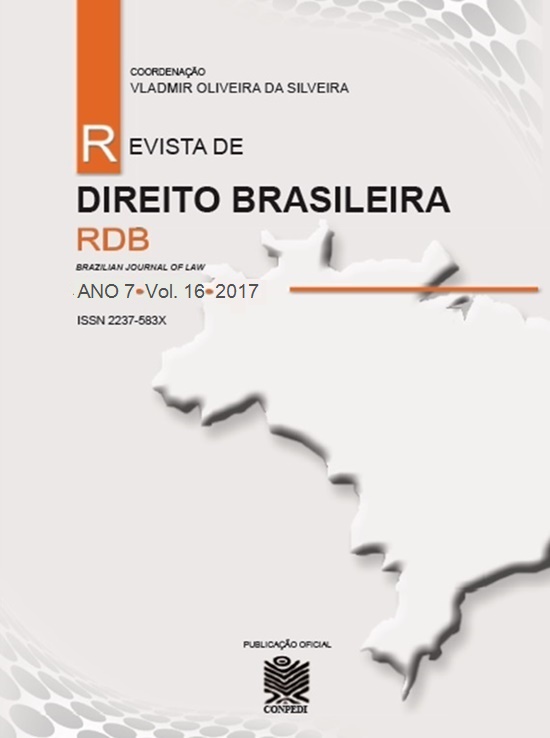JUDICIAL ACTIVISM OR JUDICIAL CREATION OF LAW? THE ROLE OF CONSTITUTIONAL COURT IN THE CONSTITUTIONAL OMISSIONS – A COMPARATIVE ANALYSIS
Main Article Content
Abstract
Downloads
Article Details
• O(s) autor(es) garante(m) que a contribuição é original e inédita e que não está em processo de avaliação em outra(s) revista(s);
• A revista não se responsabiliza pelas opiniões, ideias e conceitos emitidos nos textos, por serem de inteira responsabilidade de seu(s) autor(es);
• É reservado aos editores o direito de proceder ajustes textuais e de adequação do artigo às normas da publicação.
Autores mantêm os direitos autorais e concedem à revista o direito de primeira publicação, com o trabalho simultaneamente licenciado sob a Licença Creative Commons Attribution que permite o compartilhamento do trabalho com reconhecimento da autoria e publicação inicial nesta revista.
Autores têm autorização para assumir contratos adicionais separadamente, para distribuição não exclusiva da versão do trabalho publicada nesta revista (ex.: publicar em repositório institucional ou como capítulo de livro), com reconhecimento de autoria e publicação inicial nesta revista.
Autores têm permissão e são estimulados a publicar e distribuir seu trabalho online (ex.: em repositórios institucionais ou na sua página pessoal) a qualquer ponto antes ou durante o processo editorial, já que isso pode gerar alterações produtivas, bem como aumentar o impacto e a citação do trabalho publicado (Veja O Efeito do Acesso Livre) emhttp://opcit.eprints.org/oacitation-biblio.html
References
__________________. The New Separation of Powers, Harvard Law Review, v. 113, n. 3, January, 2000. Disponível em
_________________. Good-bye, Montesquieu originalmente na Comparative Administrative Law, 2010. Disponível em:
AMERICAN BAR FOUNDATION RESEARCH JOURNAL. The “Roots” of “Rootless Activism”. The Burger Court: The Counter-Revolution That Wasn´t. Review by Joel B. Grossman. Edited by Vincent Blasi. New Haven: The Yale University Press, 1983.
BARROSO, Luís Roberto. Curso de direito constitucional contemporâneo: os conceitos fundamentais e a construção do novo modelo.2 ed. São Paulo: Saraiva, 2010.
Beals, Melba Pattillo.Warriors don't cry: a searing memoir of the battle to integrate Little Rock's Central High. New York: Pocket Books, 1994.
BRANCO, Paulo Gustavo Gonet. Em busca de um conceito fugidio – o ativismo judicial. In As novas faces do ativismo judicial. Salvador: Podium, 2011.
BRASIL, Constituição (1988). Constituição da República Federativa do Brasil. Disponível em < http://www.planalto.gov.br/ccivil_03/Constituicao/ConstituicaoCompilado.htm>. Compulsado em 30/07/2015.
BONAVIDES, Paulo. Do Estado liberal ao Estado social. São Paulo: Malheiros Editores, 1996.
CAMPOS, Carlos Alexandre de Azevedo. A evolução do ativismo judicial na Suprema Corte Norte-Americana II. RIDB, Ano 2 (2013), nº 7. Disponível em http://www.idp-fdul.com/ISSN: 2182-7567. Compulsado em 30/05/2015.
CAPPELLETTI, Mauro. Juízes Legisladores?.Porto Alegre: Fabris, 1993.
___________________. Controle judicial de constitucionalidade das leis no direito comparado. 2 ed. Porto Alegre: Sérgio Fabris, 1992.
COELHO, Inocêncio Mártires. Apontamentos para um debate sobre o ativismo judicial. Revista Brasileira de Políticas Públicas, Brasília, v. 5. Número Especial, 2015.
DAVIES, Richards. Justices and Journalists: The U.S. Supreme Court and the Media. New York: Cambridge University Press, 2011.
HART, Hebert L. A. O conceito de direito. 5 ed. Lisboa: Gulbenkian, 2007.
HORWITZ, Morton J. The Warren Court and the Pursuit of Justice. New York: Hill and Wang, 1998.
KMIEC, Keenan D. The Origin and Current Meanings of Judicial Activism. California Law Review. Vol. 92. Issue 5. October/2004. Disponível em http://www.constitution.org/lrev/kmiec/judicial_activism.htm. Compulsado em 21/05/2015.
LEAL, Saul Tourinho. Ativismo ou Altivez: o outro lado do Supremo Tribunal Federal. Belo Horizonte: Editora Fórum, 2010.
LUHMANN, Niklas. Sociologia do Direito I. tradução de Gustavo Bayer. Rio de Janeiro: Edições Tempo Brasileiro, 1983.
Martin, Waldo E., Jr. Brown v. Board of Education: A Brief History with Documents. Boston: Bedford/St. Martins, 1998.
MENDES, Gilmar Ferreira. Estado de direito e jurisdição constitucional. São Paulo: Saraiva, 2011.
_______________________. BRANCO, Paulo Gustavo Gonet. Curso de direito constitucional. 7 ed. São Paulo: Saraiva, 2012.
MONTESQUIEU, Charles Louis de. Do Espírito das Leis – in Coleção Os Pensadores - Montesquieu. São Paulo: Abril Cultural, 1973.
RAMOS, Elival da Silva. Ativismo Judicial: parâmetros dogmáticos. São Paulo: Saraiva, 2010.
ROSE-ACKERMAN, Susan. LINDSETH, Peter L. Comparative administrative law: an introduction. Cheltenham, UK: Edward Elgar Publishing, 2010. Print. Elgar Online. Web. 28 Jun.16. 2015. Disponível em
ROSS, Alf. Direito e justiça. Bauru: Edipro, 2003.
STRAUSS, David. The living Constitution. Oxford USA Professio, 2010.
TUSHNET, Mark. The Supreme Court and the National Political Order. In: KAHN, Ronald; Kersch, Ken I. (Ed.) The Supreme Court & American Political Development. Lawrence: Kansas, 2006.





